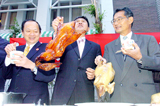PRECAUTIONARY STEP: The preliminary results of the tests were inconsistent with health conditions, but the results of a second test will be available within two days
By Meggie Lu
STAFF REPORTER
Friday, Dec 19, 2008
Responding to speculation that the examination process may have been delayed as the possible infection was reported almost two months ago, COA Bureau of Animal and Plant Health Inspection and Quarantine Deputy Director-General Huang Kuo-ching (黃國青) said the examination process followed protocol.
Secondary results will be published this week, Huang said.
“On Oct. 21 we received a report about a possible H5N2 infection at a chicken farm in Kaohsiung County and went to collect samples for analysis; [we] had the results by Nov. 12,” Huang said.
Though the results were positive, because the death rate of the birds was less than 3 percent and the chickens did not have respiratory tract infections, the results were inconsistent with the health condition of the affected chicken population, Huang said, adding: “The expert panel decided to collect a second sample on the same day [Nov. 12th] … the result of which will be available in the next two days.”
All remaining 18,000 chickens at the farm were culled as a precautionary measure, the COA said.
The former chairman of the inter-ministy avian and pandemic influenza control committee, Chen Chien-jen (陳建仁), of the Academia Sinica, said that whether Taiwan has a bird flu epidemic or not, the COA should make comprehensive epidemic-prevention efforts upon the discovery of any strain of bird flu.
He added that the COA should make the information available to minimize public concern.
Chen said that while the polymerase chain reaction (PCR) technique can reveal whether an examination sample carries the H5N2 virus strain within a day, the separation and cultivation of the virus, which can further confirm PCR results, takes a month.
What is important is that, “[In the meantime], a standard operating procedure [SOP] should be launched to prevent the possible spread of an epidemic [before results are out],” he said.
Chen said that a complete disinfection should be carried out at the affected chicken farm, and the chickens should be inspected and possibly slaughtered as soon as a possible epidemic is suspected.
H5N2 is a weak strain of the bird flu virus that is unlikely to be transmitted to humans and the law does not require that the discovery of the virus be reported.
However, as the news is now out in the open, Chen said, “If the government had done [all it could to prevent an epidemic], it should tell people and let people know that the case has been dealt with and closed.”
When asked to comment, Huang said the culture separation and cultivation process takes between 19 and 40 days. While the first examination of the Kaohsiung chicken farm took 19 days, the second examination will also come out within the 40-day bracket.
In terms of prevention work, Huang said: “We treated it as a crisis — we launched the SOP on Oct. 21 and have been monitoring chicken farms nearby since.”
He said the affected chicken population was slaughtered on Nov. 14.
In related news, responding to Japan’s decision to temporarily stall poultry imports from Taiwan, COA poultry production section-chief Su Meng-lan (蘇夢蘭) said Japan would lift the ban if the tests prove negative.
She said poultry exports to Japan brought in between NT$70 million (US$2.15 million) to NT80 million a year.
Meanwhile, Chinese Nationalist Party (KMT) caucus deputy secretary-general Lu Hsueh-chang (呂學樟) urged the government to reinforce gate-keeping measures to ensure the quality of domestic poultry.
At a press conference, Lu said Japan’s reaction to the suspected bird flu case was “within expectations,” but the government should take action to prevent similar cases.
Lu and another KMT deputy secretary-general, Yang Chiung-ying (楊瓊瓔), challenged Chen’s comments that the PCR test could be completed within one day and that he found the COA’s slow progress “strange.”
Yang also rebutted media speculation that the COA might have covered things up because of Chinese envoy Chen Yunlin’s (陳雲林) visit early last month.
“Not everything is political,” she said.

No comments:
Post a Comment